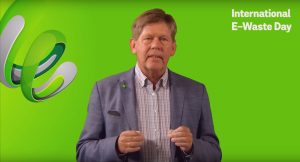It is estimated that by 2019, 50 Million Metric Tons of electronic waste will be generated worldwide. Half of this is personal equipment such as computers, monitors, smartphones, tablets and televisions, the rest is larger household appliances and heating and cooling appliances. However, only a fifth of these are recycled. This is just one aspect that the International E-Waste Day on 14 October should draw attention to.
Only 20 percent recycled worldwide!
Since last year, on the International E-Waste Day, the public has been made particularly aware of the correct recycling of electronic waste (WEEE). More than 50 organizations from over 40 different countries around the world will demonstrate the importance of correct WEEE recycling with initiatives on this day. Currently, only 20 percent of the world’s electrical and electronic waste is recycled. This means that 40 Million Metric Tons of old electrical and electronic equipment are either landfilled, incinerated or illegally traded annually and not properly dismantled or processed. This means an enormous danger for the environment and also results in enormous losses of valuable raw materials!
Even in the EU, which is the world leader in recycling electronic waste, only 35 percent of waste is officially reported as collected and recycled. Society’s lack of awareness makes it impossible to develop closed-loop systems for electronic equipment. Chris Slijkhuis, the new Managing Director of MGG Polymers, in his capacity as a board member of EERA, the Association of European Electronics Recycling Companies, draws attention to this in a video message.
There is a lot to do
„The fact that around two thirds of electronic waste is not recorded is a huge problem. Because this waste is nevertheless processed – often under inferior conditions and with a poor result. This situation must be improved in the interest of all concerned, future generations and the environment,“ Slijkhuis is convinced that something must be done.
The big goal, of course, is to recycle all electronic and electrical equipment properly. Therefore, Slijkhuis demands that standards in this area be defined and implemented. This should also be helped by simpler cross-border transport between the facilities of official recycling companies (keyword: fast-track notifications).
Chris Slijkhuis is convinced that this is the only way to make the concept of recycling a reality: „Hopefully the numerous initiatives on 14 October will help society as a whole to become aware of the importance of recycling electrical and electronic waste for all of us“.

